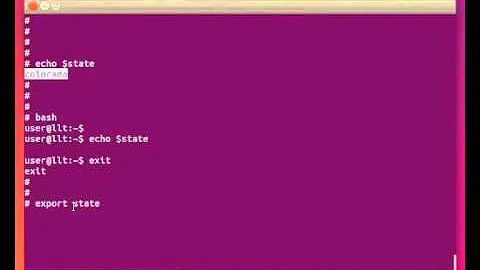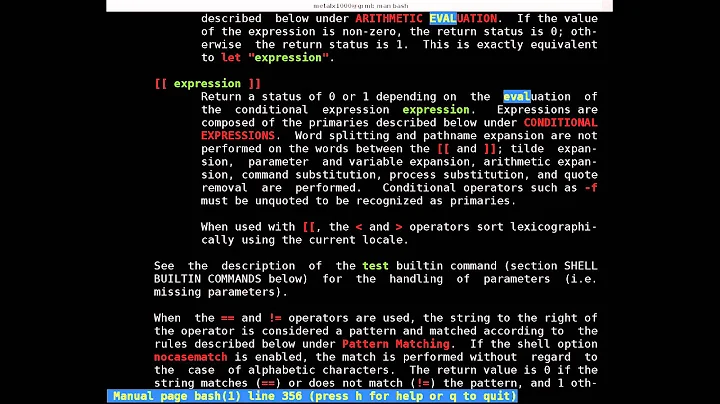Variable as command; eval vs bash -c
Solution 1
eval "$1" executes the command in the current script. It can set and use shell variables from the current script, set environment variables for the current script, set and use functions from the current script, set the current directory, umask, limits and other attributes for the current script, and so on. bash -c "$1" executes the command in a completely separate script, which inherits environment variables, file descriptors and other process environment (but does not transmit any change back) but does not inherit internal shell settings (shell variables, functions, options, traps, etc.).
There is another way, (eval "$1"), which executes the command in a subshell: it inherits everything from the calling script but does not transmit any change back.
For example, assuming that the variable dir isn't exported and $1 is cd "$foo"; ls, then:
cd /starting/directory; foo=/somewhere/else; eval "$1"; pwdlists the content of/somewhere/elseand prints/somewhere/else.cd /starting/directory; foo=/somewhere/else; (eval "$1"); pwdlists the content of/somewhere/elseand prints/starting/directory.cd /starting/directory; foo=/somewhere/else; bash -c "$1"; pwdlists the content of/starting/directory(becausecd ""doesn't change the current directory) and prints/starting/directory.
Solution 2
The most important difference between
bash -c "$1"
And
eval "$1"
Is that the former runs in a subshell and the latter does not. So:
set -- 'var=something'
bash -c "$1"
echo "$var"
OUTPUT:
#there doesn't seem to be anything here
set -- 'var=something'
eval "$1"
echo "$var"
OUTPUT:
something
I have no idea why anyone would ever use the executable bash in that way, though. If you must invoke it, use the POSIX guaranteed built-in sh. Or (subshell eval) if you wish to protect your environment.
Personally, I prefer the shell's .dot above all.
printf 'var=something%d ; echo "$var"\n' `seq 1 5` | . /dev/fd/0
OUTPUT
something1
something2
something3
something4
something5
BUT DO YOU NEED IT AT ALL?
The only cause to use either, really, is in the event that your variable actually assigns or evaluates another, or word-splitting is important to the output.
For instance:
var='echo this is var' ; $var
OUTPUT:
this is var
That works, but only because echo doesn't care about its argument count.
var='echo "this is var"' ; $var
OUTPUT:
"this is var"
See? The double-quotes come along because the result of the shell's expansion of $var is not evaluated for quote-removal.
var='printf %s\\n "this is var"' ; $var
OUTPUT:
"this
is
var"
But with eval or sh:
var='echo "this is var"' ; eval "$var" ; sh -c "$var"
OUTPUT:
this is var
this is var
When we use eval or sh the shell takes a second pass at the results of the expansions and evaluates them as a potential command as well, and so the quotes make a difference. You can also do:
. <<VAR /dev/fd/0
${var:=echo "this is var"}
#END
VAR
OUTPUT
this is var
Solution 3
I did a quick test:
time bash -c 'for i in {1..10000}; do bash -c "/bin/echo hi"; done'
time bash -c 'for i in {1..10000}; eval "/bin/echo hi"; done'
(Yes, I know, I used bash -c to execute the loop but that should not make a difference).
The results:
eval : 1.17s
bash -c : 7.15s
So eval is faster. From the man page of eval:
The eval utility shall construct a command by concatenating arguments together, separating each with a character. The constructed command shall be read and executed by the shell.
bash -c of course, executes the command in a bash shell. One note: I used /bin/echo because echo is a shell built-in with bash, meaning a new process does not need to be started. Replacing /bin/echo with echo for the bash -c test, it took 1.28s. That is about the same. Hovever, eval is faster for running executables. The key difference here is that eval does not start a new shell (it executes the command in the current one) whereas bash -c starts a new shell, then executes the command in the new shell. Starting a new shell takes time, and that is why bash -c is slower than eval.
Related videos on Youtube
biepbiep
Updated on September 18, 2022Comments
-
biepbiep almost 2 years
I was reading a bash script someone made and I noticed that the author doesn't use eval to evaluate a variable as a command
The author usedbash -c "$1"instead of
eval "$1"I assume using eval is the preferred method and it's probably faster anyway. Is that true?
Is there any practical difference between the two? What are notable differences between the two?-
 Dennis about 10 yearsIn some occasions, you can get away without either.
Dennis about 10 yearsIn some occasions, you can get away without either.e='echo foo'; $eworks just fine.
-
-
Jeff Hewitt about 10 yearsI think the OP wants to compare
bash -cwithevalnotexec. -
 PlasmaPower about 10 years@JosephR. It should be fixed now. Also I redid the tests a bit more and
PlasmaPower about 10 years@JosephR. It should be fixed now. Also I redid the tests a bit more andbash -cisn't that bad... -
 Gilles 'SO- stop being evil' about 10 yearsWhile this is true, it misses the fundamental difference that the command is executed in different environments. It's obvious that starting a new instance of bash will be slower, this is not an interesting observation.
Gilles 'SO- stop being evil' about 10 yearsWhile this is true, it misses the fundamental difference that the command is executed in different environments. It's obvious that starting a new instance of bash will be slower, this is not an interesting observation. -
biepbiep about 10 yearsThanks. I didn't know about (eval "$1"), is it any different from source?
-
 Gilles 'SO- stop being evil' about 10 years@whoami
Gilles 'SO- stop being evil' about 10 years@whoami(eval "$1")has nothing to do withsource. It's just a combination of(…)andeval.source foois roughly equivalent toeval "$(cat foo)". -
 mikeserv about 10 yearsWe must have been writing our answers at the same time...
mikeserv about 10 yearsWe must have been writing our answers at the same time... -
 mikeserv about 10 years@whoami The primary difference between
mikeserv about 10 years@whoami The primary difference betweenevaland.dotis thatevalworks with arguments and.dotworks with files. -
biepbiep about 10 yearsThanks both of you. My previous comment appears to be kinda stupid now that I read it again...
-
 Tim almost 8 yearsby
Tim almost 8 yearsbybash "$1", did you meanbash -c "$1"?




